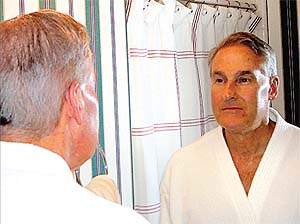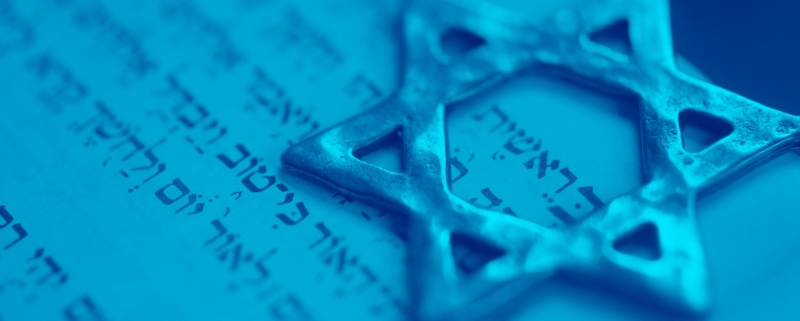
Late in the evening of September 28, 2009, following very introspective and rewarding Yom Kippur services at Congregation Ohabai Shalom in Nashville, I took a hot shower and then stood, wrapped in a towel, in front of the bathroom mirror. As I brushed my teeth, I reflected on my experience of this most prayerful of days, when Jews throughout the world come to grips with their mistakes and seek atonement. Looking straight into the mirror, I began to say my evening prayers, something I have done since childhood. I whispered my thanks to God for bringing me to this day; for my life, health, and strength; for my home; for my wonderful supportive family. I asked God for empowerment to help me be a better son, father, and husband in the coming year. I asked for guidance, humility, an end to evil and oppression, and for the strength to make my life a blessing, as had those who came before me.
As I prayed, the mirror before me began to take on greater significance-not as a means of vanity or to exclude God, but rather as an instrument to ensure that I stepped up to become God's partner.
I thought of a scene from the 2003 film Bruce Almighty, a comedy in which Morgan Freeman plays the role of God and Jim Carrey portrays Bruce Nolan, a man given the chance to be God for one week. When Bruce inquires about the millions of tiny blinking lights in a large warehouse, God explains that each blink represents an individual prayer being offered for consideration. Bruce becomes overwhelmed by the prospect of having to respond to so many supplicants, so God reassures him, explaining that in most cases, if humans would only look into the mirror, they would see who is primarily responsible for answering the majority of prayers.
My thoughts then turned to these words which my rabbi, Mark Schiftan, has long tried to teach us: "Pray as if everything depended upon God. Act as if everything depended on you." (Much later, this wise teaching would be integrated into our Movement's new prayer book, Mishkan T'filah: A Reform Siddur.)
Suddenly, these two coalesced and I understood: Only I was personally responsible for the empowering of my own prayers-for reaching down deep within myself to summon strength, courage, and wisdom.
It had taken my lifetime-61 years-to fully appreciate Rabbi Schiftan's message. Thanks to that reflection in the mirror, I had gotten it: It was up to me to make the world a better place.
Graced with this new understanding, I composed a personal "Prelude to Prayer." It begins by looking inward and offering personal thanks, asks for empowerment to help those less fortunate, and seeks humility and guidance. It moves to a wider perspective with my hope that all people will feel God's presence, that corruption and evil will disappear, and that the natural rights of us all will be recognized as unalienable. The historical perspective comes next, as I honor the lives of those who have come before me (my grandmother Dora used to comment that when we say nice things about the dead, they are dancing in Heaven), and contemplate my own mortality-my place in history. Finally, it returns to the present, reminding me that the face in the mirror is primarily responsible for making my life a blessing, which means my making the world a better place. It concludes: "Teach me to pray as if everything depends upon You and to act as if everything depends upon me! Amen."
I call upon my prelude often, reciting it whenever and wherever I pray, in and out of the temple-while driving or running in the park, sometimes just before falling asleep, and always in the quiet of early morning before I rise. It helps guide my prayer into action-what I should be doing to improve my family, my life,
and my country.
Now that I have fully internalized an understanding of personal responsibility in prayer, using a mirror is no longer necessary. Just as we learn to ride a bicycle with the use of training wheels and the need for them evaporates as soon as we've mastered the riding skill, so too we can, over time, become our own mirrors.
Armed with a desire to give something back, I left the corporate world behind to join Second Harvest Food Bank of Middle and West Tennessee. One morning, hundreds of hungry people showed up at our mobile pantry distribution site.
Walking among my fellow Tennesseans who had been standing in line since early morning in the sweltering sun, I pinched myself to fully comprehend that this was not taking place in some undeveloped country, but in the United States of America, in my home state, near my hometown! As I spoke with these people who had fallen through society's safety nets, I looked into their eyes, and their desperation and pain hit me right in the face-just as I had been struck by my own reflection in the bathroom mirror that Yom Kippur evening. Each look demanded an action from my volunteer colleagues and me. There was no time to recite prayers and pass the buck to God. God was depending upon us to make a difference.
Charles R. Krivcher is a lawyer, retired soldier, fundraiser for Second Harvest Food Bank of Middle and West Tennessee, and member of Congregation Ohabai Shalom, Nashville.
Explore Jewish Life and Get Inspired
Subscribe for Emails
